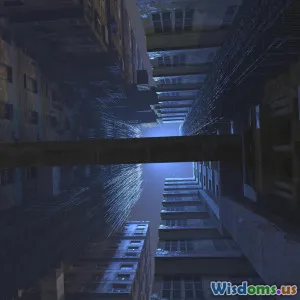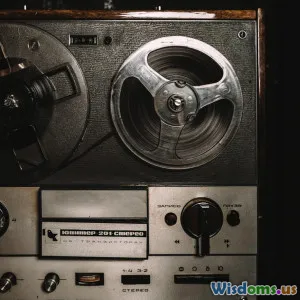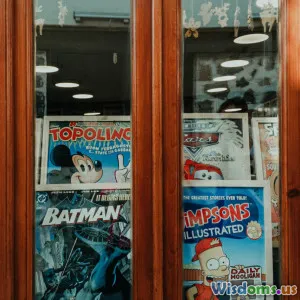
The Secret Language of Donnie Darko Fans Explained
9 min read Unveiling the cryptic language and symbols embraced by Donnie Darko fans, revealing its impact on cult culture and fan community dynamics. (0 Reviews)
The Secret Language of Donnie Darko Fans Explained
Introduction
Few films inspire the kind of devoted fanbase and rich subculture as Donnie Darko, Richard Kelly’s 2001 cult classic. Beneath its haunting narrative about time travel, alternate realities, and teenage angst lies not only a cinematic experience but an entire lexicon—an esoteric and symbolic language cultivated by fans. This insider mode of communication extends beyond casual discussions; it’s a form of identity, a cryptic code that nurtures connection and interpretation across decades. This article unravels the intricacies of this secret language, exploring its origins, components, and its significance within the broader cult fandom community.
Origins of the Secret Language
The mystique surrounding Donnie Darko itself is fertile ground for cultivating a unique lexicon. The film’s narrative complexity, philosophical underpinnings, and eerie symbolism laid the groundwork for cryptic fan discourse. When the film struggled to gain commercial success initially but exploded in significance via DVD and midnight screenings, its fanbase organically formed a culture based on deep analysis and shared coded references.
Several factors contributed to this language's emergence:
- Ambiguous narrative: Open-ended plot interpretations encouraged diverse and layered readings, fostering specialized terms.
- Iconic symbols: Characters like Frank the rabbit or elements like the manipulated dead rabbit masks became instantly recognizable symbols.
- Philosophical influences: Themes involving time travel, predestination, and existentialism inspired fans to incorporate technical terms and philosophical jargon.
Components of the Secret Language
The Donnie Darko fan lexicon is multifaceted, encompassing various elements:
1. Symbolic Vocabulary
-
Frank the Rabbit: Not just a character but a symbol of fate and death’s ambiguity. Fans often reference "following Frank" as engaging with destiny or hidden knowledge.
-
Tangential Universe: An essential term referring to the alternate timeline or "wormhole" timeline. "Tangential" conversations indicate discussions steeped in alternate possibilities or hidden realities.
-
The Artifact: The mysterious jet engine crash device central to the plot became slang for inexplicable, disruptive events.
-
Eating the Bones: A metaphor derived from a scene where Donnie eats a frozen carrot like a bone, representing embracing the bizarre or confronting fears.
2. Catchphrases and Codes
-
"Why Are You Wearing That Stupid Man Suit?": An iconic line from Frank signifies identification of authenticity or challenging perceived social masks.
-
“500 Days for a Soul to Return”: Fans use this phrase in metaphorical discussions about healing, loss, or cycles of change.
-
AR Lee’s Riddle (Time Travel Rules): Fans often quiz one another with "The Philosophy of Time Travel" excerpts to test knowledge or deepen theoretical dialogue.
3. Numeric and Temporal References
Like the film’s fixation on time manipulation, fans incorporate specific timeline counts and dates into greetings or challenges.
-
"October 2nd": The date when the manipulated dead rabbit appears serves as a memorialized fan celebration and subtle coded greeting.
-
28 Days: Refers to the time machine loop, also used metaphorically for periods of introspection or transformation.
4. Visual and Gesture-Based Communication
-
Frank Rabbit Masks: Online and offline, fans frequently use Frank-style rabbit imagery as avatars or wear masks at gatherings—symbolizing allegiance and shared knowledge.
-
Mirror and Reflection Motifs: Posing or sharing mirror selfies hinting at dual realities or self-awareness, connecting to Donnie’s confrontations with parallel selves.
Examples in the Wild: Real-World Insights
Fan Conventions and Gatherings
At fan meetups or Donnie Darko conventions:
-
Wearing Frank masks and using cryptic greetings like "See you in the tangential universe" signals insider status.
-
Panels often begin with quotes from "The Philosophy of Time Travel" as unifying mantras.
-
Fans exchange memorabilia with symbols like jet engine drawings to reinforce shared language.
Digital Communities
Reddit subgroups, Tumblr tags, and Discord servers use specific hashtags like #WhyAreYouWearingThatManSuit or #DonnieTimeTravel to categorize discussions or memes—a form of language shorthand.
Members riff on movie moments, invent fan theories enhancing the language with hypothetical jargon such as "Frank Spectrum" or "Artifact Theory." These neologisms resonate with the original movie’s atmosphere but evolve organically.
Cultural Impact
The secret language also embodies a collective experience of existential questioning and nonconformity:
-
Fans describe their engagement as entering a "Donnie mindset," inviting philosophical debate about choice, fate, and mental health.
-
Academic discourse occasionally cites these coded fan communications as subjects of cultural study, underlining the film’s lasting impact.
Why This Language Matters
Identity and Belonging
Secret languages foster a sense of community among fans spread worldwide, uniting individuals who appreciated the film beyond surface entertainment.
Creativity and Interpretation
The language reflects the creative ways fans parse complex media—generating new meaning through interactive decoding and shared symbols.
Emotional Connection
Many fans resonate with the film’s emotional undertones—the secret language becomes a vessel to express vulnerability, hope, and alienation.
Conclusion
The secret language of Donnie Darko fans transcends fandom; it is an evolving, living corpus of symbols, phrases, and cultural signifiers. Rooted in the film’s enigmatic narrative and augmented by layered philosophical questions, this cryptic dialect offers an extraordinary example of how media can engender unique social codes and identities. For new fans, learning this language invites deeper immersion; for veterans, it remains a badge of belonging to a passionate, reflective community. Ultimately, it celebrates the enduring power of storytelling to unite and transform beyond the screen.
Whether you call it a cult language or an intimate insider code, the secret language of Donnie Darko fans exemplifies fandom’s beautiful complexity—where meaning hides in plain sight, awaiting curious minds.
Further Reading & Resources
- The Philosophy of Time Travel by Roberta Sparrow in the Donnie Darko universe: A fan-translated guide to the film’s metaphysics.
- Fan forums and online archives with transcriptions of quotes, symbol explanations, and theory discussions.
- Scholarly articles on cult film fan linguistics and community formation.
Engage with communities to understand the living language, and who knows—you might find yourself speaking the secret tongue of the tangential universe.
This article delved into the language that has bound Donnie Darko fans in a shared culture of symbolism and philosophical inquiry, an enduring testament to the film’s enigmatic allure.
Rate the Post
User Reviews
Popular Posts


















